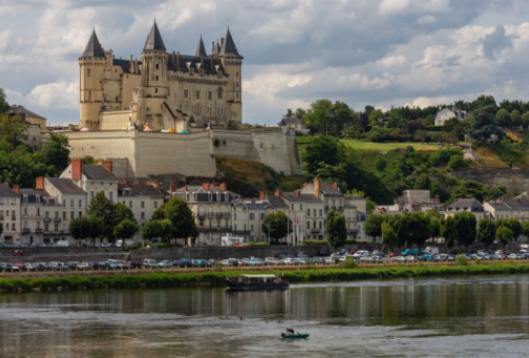For travelers looking to explore the stunning beauty and rich history of the Loire Valley, practicing sustainable tourism is crucial in minimizing environmental impact and supporting local communities. By making conscious decisions about shopping, dining, water usage, wildlife viewing, and cultural heritage preservation, visitors can ensure a responsible and respectful experience in this magical region of France.

Supporting Local Communities: Ethical Shopping and Dining in the Loire Valley
When visiting the Loire Valley, it is important to support local communities by engaging in ethical shopping and dining practices. By purchasing goods and meals from local vendors and businesses, tourists can contribute to the economic growth and sustainability of the region. Additionally, buying products that are locally sourced helps reduce carbon emissions associated with transportation, while also promoting the preservation of traditional crafts and culinary practices. By choosing to dine at restaurants that prioritize locally sourced ingredients, travelers can enjoy a deeper connection to the culture and flavors of the Loire Valley, while also supporting the livelihoods of local farmers and producers. Overall, supporting local communities through ethical shopping and dining is a key aspect of responsible travel in the Loire Valley.
Preserving Natural Resources: Tips for Responsible Water Usage During Your Visit
Here are some tips for responsible water usage during your visit:
Take shorter showers and try to conserve water wherever possible. Remember that water is a limited resource, so use it wisely.
Opt for reusing towels and linens instead of requesting fresh ones daily. This helps to reduce the amount of water and energy used for laundry.
Turn off the tap while brushing your teeth or washing your face. Even a small action like this can make a big difference in conserving water.
Choose eco-friendly accommodations that prioritize water conservation practices, such as using low-flow fixtures and implementing water recycling systems.
Support restaurants and businesses that are committed to sustainability and water conservation efforts. Consider dining at establishments that source their ingredients locally to reduce the environmental impact of transporting goods.
By following these simple tips for responsible water usage, you can help preserve the natural resources of the Loire Valley and contribute to sustainable travel practices in the region.
Protecting Wildlife: Conservation Efforts and Wildlife Viewing Guidelines in the Loire Valley
From rare bird species to majestic deer, the region is teeming with biodiversity that must be preserved for future generations to enjoy. Conservation efforts play a crucial role in protecting the wildlife of the Loire Valley, ensuring that these species thrive in their natural habitats.
One of the key conservation efforts in the region is the establishment of protected areas and wildlife reserves. These areas serve as safe havens for endangered species, providing them with a sanctuary where they can thrive without the threat of habitat destruction or poaching. By visiting these protected areas, tourists can support the conservation efforts in the Loire Valley and contribute to the preservation of its wildlife.
When it comes to wildlife viewing in the Loire Valley, it is important to follow certain guidelines to ensure the safety and well-being of the animals. Respecting the natural habitats of the wildlife is essential, as disturbing their environment can have negative impacts on their behavior and health. It is also important to maintain a respectful distance from the animals and avoid feeding them, as this can disrupt their natural diet and behavior.
In addition to following guidelines for wildlife viewing, tourists can also support conservation efforts by participating in eco-friendly activities that promote the protection of the environment and wildlife. By choosing sustainable tour operators and accommodation providers, visitors can minimize their impact on the natural surroundings and contribute to the preservation of the wildlife in the Loire Valley.
Overall, protecting wildlife in the Loire Valley is a collective effort that requires the cooperation of tourists, locals, and conservation organizations. By following conservation efforts and wildlife viewing guidelines, visitors can help ensure that the diverse wildlife of the region continues to thrive for generations to come.
Respecting Historical Sites: Cultural Heritage Preservation and Responsible Tourism Practices
When visiting these sites, it is important to practice responsible tourism in order to preserve and protect the cultural heritage of the region.
One of the most important ways to respect historical sites in the Loire Valley is to follow all rules and regulations set forth by the site managers. This includes staying on designated paths, not touching or defacing any structures or artifacts, and respecting any barriers or signs indicating restricted areas. By following these guidelines, visitors can help ensure that these sites remain intact for future generations to enjoy.
Another important aspect of respecting historical sites is to be mindful of the impact of tourism on these sites. Large crowds of visitors can put a strain on historical buildings and structures, leading to wear and tear over time. It is important for visitors to be aware of their surroundings and to be respectful of the site, being mindful of their actions and the potential impact they may have.
Additionally, supporting the preservation efforts of historical sites in the Loire Valley can help ensure that these landmarks remain intact for years to come. This can include making a donation to a preservation organization, volunteering at a historical site, or simply spreading awareness about the importance of cultural heritage preservation.
In conclusion, respecting historical sites in the Loire Valley is essential for ensuring the preservation of these important landmarks and cultural heritage sites. By following rules and regulations, being mindful of the impact of tourism, and supporting preservation efforts, visitors can help protect these sites for future generations to enjoy.
